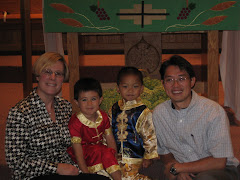Below is a short story by Kay Bratt (author of Silent Tears) which is so well written, and so very sad and haunting. In a country in which it is illegal to abandon your child for adoption, this has become the reality for many millions of children in China, including our son...
So many of the children in China are abandoned when they are just days old (due to their female gender, or a visible birth defect such as club foot, cleft lip, or birthmark, or because they are the family's second child in a country with a One Child Law, or for many other reasons we will never know). But then there are the children who are months old, toddler age, or even older when they are abandoned, and I wonder, how does one abandon a mobile child...a child who can attempt to follow you when you walk away from them...a child who has bonded with his/her parent(s)...
Aaron will soon learn what it means to have parents who will love him unconditionally forever. Every child deserves that chance at love!
Nicole
The Bridge
By Kay Bratt
The old woman squats uncomfortably outside her tiny shack while washing the laundry. The muddy ground from last night’s storm has made her ordinarily calming chore a necessary nuisance. With crooked and arthritic hands, she finishes her rapid scrubbing and expertly wrings out the last piece of clothing. The repetitive task always gives her a chance to reflect on the vagaries of her difficult life. Deep lines etched in her face reveal years of accumulated wisdom and incessant worry.
Her aching arms overloaded, she struggles to rise while trying to prevent her only pair of slippers from becoming covered with the muck. Heaving an exhausted sigh, she slings her pail of soiled water into the street, narrowly avoiding soaking a passing bicycle cab and its occupant. Words of apology are not expected or needed in this small and overcrowded community, so she slowly turns to take the clothing inside. She climbs the creaky stairs to the frigid, unused second story to hang the laundry on the metal bar outside her window. In this biting cold, the clothes will need many hours to finish drying, during which time she will ignore the nagging pain in her hands in order to work at her knitting.
The old woman collects used sweaters and knits colorful scarves from the scraps of wool she unravels. With another scarf ready to sell, she will be able to buy meat and dumplings to prepare a special meal for her daughter’s annual trip home. She is too proud to admit to her family that her usual diet consists only of rice and green vegetables. The old woman has never accepted help from anyone, and this time will be no different. She will just have to work harder and faster to earn the money needed to make this visit special.
Later on, from the corner of her eye, she spots a small boy sitting on the first step of the ancient Bridge of Luck. The bridge has covered one of the city’s famous canals for over one thousand years; she longs to hear the stories it could tell. It used to carry only the weight of horses, bicycles, and people, but must now withstand a daily barrage of cars and trucks. On the pedestrian side, with his finger the small boy is tracing the carvings of dragons and phoenixes embedded in the old stone. He was a healthy-looking boy of six or so, with the darker skin and wider eyes of a person from the countryside or a minority village.
Judging by the thickness of his arms, his mother probably let him hold the baskets when his family brought in last season’s crop. The old woman is troubled to see he is dressed poorly, with only one thin layer of tattered clothing to protect him from the bitter wind. She notices he is not as active as a normal boy of his age should be, but instead appears to be in a state of anxiety or bewilderment.
“Not another one,” she mutters under her breath.
Every month at least two or three children, sometimes even helpless newborns, are abandoned at this bridge. The parents superstitiously imagine this is one last gift to bestow on their offspring?leaving them at a place they believe will bring eternal luck.
Back in my time, she muses, we would take care of our own children no matter the cost or burden. These days, however, many children are discarded because their parents cannot afford them, are displeased with having a girl rather than a boy, or are ashamed to raise a child with a disability. For the old woman, the rescuing of these unfortunate waifs has been her lifetime duty. This time enough is enough, and she is determined not to become involved.
Does no one take responsibility for their own flesh anymore? She thinks despairingly. They know government policies put restrictions on how many children a couple can raise. The mothers should be thinking of this before being so irresponsible with their men. They don’t consider the inevitable problems of parenthood before becoming pregnant, because they know how easy it is to commit this act of cowardice?this abandonment?after their babies are born.
She thinks disapprovingly of how China continually boasts of the many improvements and successful developments of the last century, but this one subject remains an unspoken blemish mostly hidden in shame from the rest of the world.
Perhaps she is wrong and this boy is only out exploring the city, or maybe his parents have left him for a short time and will return. With a last worried glance, she returns to scrubbing her stone floors.
Several hours and chores later and following a small meal with several cups of green tea to help ease her hunger, the woman prepares to lie down for her much anticipated afternoon nap. As she reaches to close the curtain, she can’t resist another look. She is struck with the realization that the boy on the bridge is blind. He has stopped crying and has ventured a few steps from the bridge, using his chubby hands to feel the way. He was calling for someone.
I am not taking another child to the orphanage, the old woman argues with herself. Let someone else do it for a change. The many children and babies she has delivered to the authorities over the years have burned holes in her heart and haunted her dreams at night.
She is now a wrinkled old woman with tired bones and a jaded mind. Why can she not live out the remainder of her life without further turmoil? Why had her family’s ancestors chosen to make their home in front of this ironically “lucky” bridge? Why was it she who’d been selected to witness such sadness? Had this also been the fate of her mother and grandmother, who had lived here before her? If she’d had any other place to go, she would have left a decade ago, of this she is sure.
As she stands at the window regressing into her past, she spots someone approaching the other side of the bridge. The young woman wears a tired and discouraged expression as she silently creeps closer. She squats in a nearby doorway, making it obvious she has come to spy upon the boy, though it is equally plain to see she doesn’t want him to know she is there.
The old woman watches. It is his mother, she thinks sagely. What a cruel thing for a wretched old thing like me to witness.
Though disgusted, she cannot pull herself away from the unfolding drama. Wrapping herself in an old quilt, she pulls up a chair to keep vigil. She can see the mother is becoming worried, wringing her hands helplessly while observing the many people casting pitying glances at her son but not offering him help. The cold night is coming on fast, and she is clearly fighting a battle within herself; she probably wants to run to him and hold him close one more time, but does not want to prolong the agony of the inevitable.
From the window, the old woman can see the wash of tears falling silently down the young mother’s scarlet cheeks. She struggles with her mixed feelings of anger and empathy for this young mother’s plight. She battles the knowledge that she could either rescue this boy or watch him suffer through the night.
The old woman returns to her kitchen and prepares a heaping bowl of hot rice porridge. Resignedly, she lays her near-finished scarf across her arm.
Oh, the many children who have worn my scarves, she laments. She allows herself only a short moment to sift through the memories and faces of those in her past before focusing on the current situation.
With one hand on her trusted cane and the other holding the food and scarf, she hobbles out of her home and toward the boy. As she moves closer, the young, desperate woman notices her and prepares to flee. The old woman solemnly stares into her eyes, giving her a knowing nod of compassion. Methodically, she continues to work her way through the evening traffic, pausing to let the hordes of foot and vehicular traffic pass. The mother stares, her shoulders bent in a stance of shame but with relief evident in her haunted eyes.
The boy whimpers once more as he stumbles over the uneven walkway and back to the steps of the bridge. He is not brave enough to go farther and wants to stay where his mother can find him. She promised she was coming back, but now where was she? Why was she taking so long? He wants to smell her familiar scent and be led back to his safe, comfortable home. He is tired, cold, and very frightened. He has tried to act like a big boy but can no longer stanch the flow of tears.
The old woman stops in front of him and stoops to give him a reassuring pat on the head. She wraps the unfinished, multicolored scarf around his shoulders and begins speaking to him gently. He is at first scared by the intrusion into his dark, private world but the soothing sound of her grandmotherly voice and the warmth of the scarf calms him. Lowering her aching body, the old woman sits down beside the boy and offers him the steaming food.
Behind her son, the heartbroken mother blows a soft kiss into the air, says a silent goodbye, and slips away into the dark. As the boy begins to devour his first meal that day, the old woman mentally prepares herself for a sleepless night consoling this latest unlucky child.
“Don’t worry, little one,” she whispers, “for now you will have a warm pallet to sleep on and tomorrow your new life will begin.”
*this short story was inspired by Fei Fei, a small blind boy brought to our orphanage. It is my hope that he was able to be enrolled in the local Blind/Deaf school and is possibly living a much easier life than he was when I last saw him. Fei Fei means to fly– and I try to picture him doing just that, with wings of freedom from his disability.
Sunday, February 28, 2010
Subscribe to:
Post Comments (Atom)











No comments:
Post a Comment